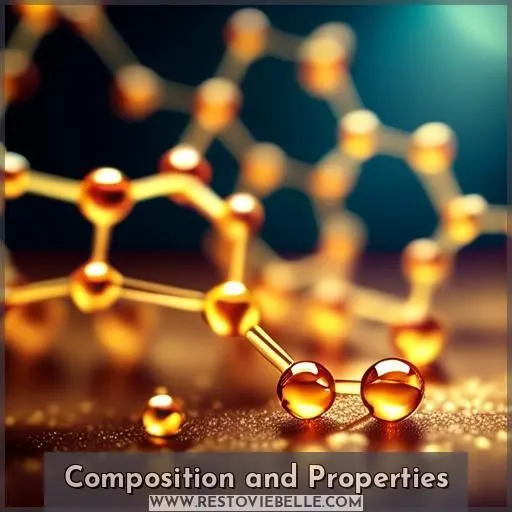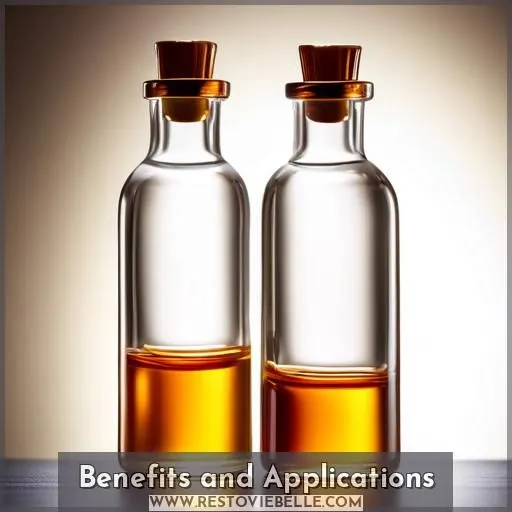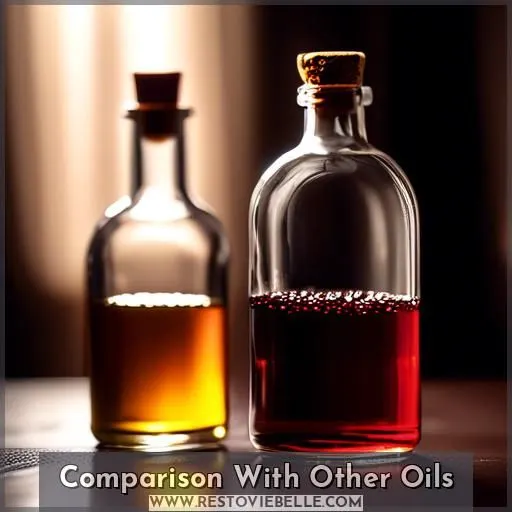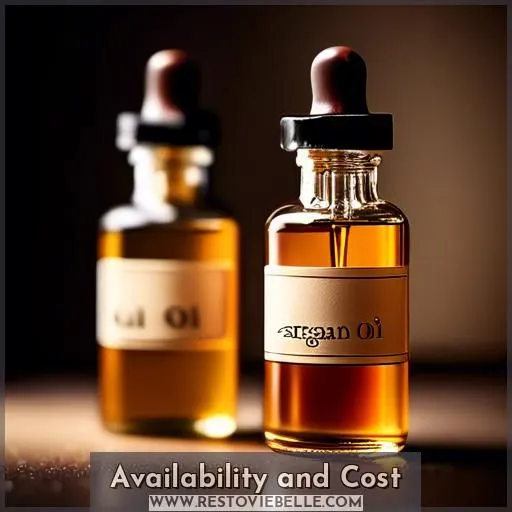This site is supported by our readers. We may earn a commission, at no cost to you, if you purchase through links.
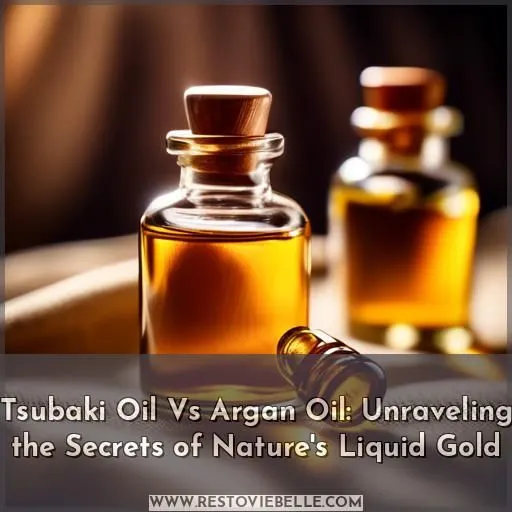
When considering tsubaki oil vs argan oil, both offer impressive skincare and haircare benefits. Tsubaki oil is rich in oleic and linoleic acids, providing exceptional moisturizing and anti-inflammatory properties.
Argan oil, on the other hand, boasts a high concentration of oleic acid and tocopherols, making it a potent antioxidant.
While tsubaki oil is generally more expensive, the quality and extraction methods can vary greatly between brands.
Ultimately, both oils are suitable for all skin types and deliver nourishing, protective effects. To fully unravel the secrets of these natural wonders and discover which one is best for your needs, keep reading.
Table Of Contents
Key Takeaways
Tsubaki oil, also known as camellia oil, is extracted from the seeds of the Camellia japonica plant and is rich in oleic acid, linoleic acid, and antioxidants like vitamins A, D, C, and E. It’s known for its lightweight and quick-absorbing properties, making it suitable for a wide range of applications, including cosmetics, skincare, and hair care.
Argan oil, on the other hand, is derived from the kernels of the Argan tree (Argania spinosa) and is high in oleic acid, linoleic acid, and tocopherols. It’s particularly beneficial for dry, mature, and acne-prone skin, as well as for hair and nails, and is known for its nourishing, regenerating, and protective properties.
Both oils have antioxidant properties and can be purchased online or at specialty stores, with prices varying depending on factors such as brand, size, and quality.
When selecting a brand, consider the extraction methods, safety, allergies, preservation, and shelf life to ensure the quality and safety of the product.
Composition and Properties
Tsubaki oil, also known as camellia oil, is extracted from the seeds of the Camellia japonica plant, while Argan oil is derived from the kernels of the Argan tree (Argania spinosa). Both oils are rich in unsaturated fatty acids, with oleic acid being the most abundant in both. However, the fatty acid composition of Tsubaki oil is more diverse, containing oleic acid (more than 80%), linoleic acid, and other fatty acids like stearic acid, calcium, potassium, tri-terpenes, saponins, and squalane. Argan oil, on the other hand, is high in oleic acid (45%), linoleic acid, and tocopherols.
Tsubaki oil is known for its lightweight and quick-absorbing properties, making it suitable for a wide range of applications, including cosmetics, skincare, and hair care. It’s often used in soaps, creams, and shampoos due to its ability to hydrate the skin and condition the hair without leaving a greasy feel. Argan oil, while also lightweight and easily absorbed, is particularly beneficial for dry, mature, and acne-prone skin, as well as for hair and nails. It’s known for its nourishing, regenerating, and protective properties.
Both oils have antioxidant properties, with Tsubaki oil containing vitamins A, D, C, and E, as well as polyphenol antioxidants. Argan oil is rich in tocopherols, which are also antioxidants. Tsubaki oil is also known for its anti-inflammatory properties, which can help soothe dry skin and reduce inflammation.
In terms of cost, Tsubaki oil is more expensive than Argan oil, but prices can vary depending on factors such as brand, size, and quality. Both oils can be purchased online or at specialty stores, and they’re available in organic and high-quality versions.
Benefits and Applications
Regarding tsubaki oil and argan oil, their moisturizing, anti-inflammatory, and antioxidant properties make them exceptional—they profoundly nourish and safeguard the skin and hair. However, their price and accessibility can differ substantially depending on aspects such as brand, volume, and quality, so it’s essential to take into account your financial situation and preferred product level.
including their moisturizing
Diving into the hydrating power of Tsubaki and Argan oils, their lightweight textures lock in moisture, transforming dry skin with quality, skin-nourishing benefits.
anti-inflammatory
Tsubaki oil and Argan oil, two popular cosmetic oils, offer anti-inflammatory effects for skin and hair. Tsubaki oil, rich in oleic acid, supports skin barrier repair, while Argan oil, high in tocopherols, soothes scalp health. Both oils protect hair follicles and reduce skin irritation, making them ideal for hair care.
and antioxidant properties
Camellia oil and Argan oil are renowned for their moisturizing, anti-inflammatory, and antioxidant properties.
Rich in oleic acid and linoleic acid, these natural oils enhance hair health and skin hydration.
They’re ideal for use in hair conditioners, providing shine, tensile strength, and protection against damage.
Camellia oil is suitable for all skin types, while Argan oil is beneficial for dry, mature, and acne-prone skin.
Both oils are available online and at specialty stores, with prices varying depending on brand, size, and quality.
cost
The cost of these oils varies greatly based on brand, quality, and source. Consult a cosmetic chemist or skincare expert for the best value.
and affordability of both oils
Diving into the affordability and availability of Tsubaki and Argan oils, it’s like hitting the jackpot for your skin and hair. These hard-working, pleasant-smelling oils offer a treasure trove of benefits, from improving surface characteristics to enhancing color values, without breaking the bank.
considering factors such as brand
Regarding the selection between Tsubaki oil and Argan oil, the brand holds significant importance in guaranteeing the quality and safety of the product. Both oils offer unique attributes and advantages, but their extraction methods, safety, allergies, preservation, and shelf life can differ depending on the brand.
Tsubaki oil, also known as Camellia oil, is extracted from the seeds of the Japanese camellia plant and is widely used for its nourishing and calming properties for the skin and hair. It’s rich in oleic acid, linoleic acid, and antioxidants like vitamins A, D, C, and E, making it a popular choice for those with dry skin and hair.
Argan oil, on the other hand, is extracted from the kernels of the argan nut, which grows on the argnania spinosa tree in the southwestern region of Morocco. It’s known for its high content of oleic acid, linoleic acid, and tocopherols, making it beneficial for nourishing, regenerating, and protecting the skin and hair.
When selecting a brand, consider the following factors:
- Extraction methods: Look for brands that use cold-pressed extraction methods to preserve the natural properties of the oils.
- Safety: Ensure that the brand adheres to safety standards and doesn’t use harmful additives or chemicals.
- Allergies: If you have allergies or sensitivities, choose a brand that’s transparent about their ingredients and doesn’t use cross-contaminated equipment.
- Preservation: Opt for brands that use natural preservatives to maintain the oil’s quality and shelf life.
- Shelf life: Choose a brand that provides clear information about the oil’s shelf life and storage instructions.
In terms of affordability, prices can vary depending on the brand, size, and quality of the oil. High-quality, organic, and cold-pressed oils may be more expensive than their less expensive counterparts. Consider your budget and the benefits you’re looking for when choosing a brand.
Remember to always patch test any new product, including oils, before applying them to your skin or hair to ensure compatibility and prevent negative reactions.
size
Regarding size, both tsubaki oil and argan oil offer distinct benefits. Here’s a summary:
- Molecular weight: Tsubaki oil’s molecular weight closely resembles that of skin, facilitating rapid absorption.
- Skin absorption: Argan oil’s light texture enables effortless absorption by the skin, making it optimal for dry, mature, and acne-prone complexions.
- Hair benefits: Argan oil’s reduced weight and viscosity compared to olive oil render it suitable for hair conditioners.
- Comparison with other oils: Argan oil incurs a higher cost than olive oil but exhibits comparable weight and texture to jojoba oil.
and quality
Concerning the selection between Tsubaki oil and Argan oil, take into account their sustainability and cultural importance.
Tsubaki oil is renowned for its rapid absorption and anti-inflammatory attributes, making it optimal for dry skin and hair.
Argan oil, conversely, is abundant in oleic acid and linoleic acid, which can enhance hair elongation and mitigate protein loss in bleached hair.
Both oils have their advantages, but the choice hinges on your hair’s requirements and preferences.
Comparison With Other Oils
When comparing Argan oil and Camellia oil, it’s important to take into account their fatty acid composition. Both oils contain unsaturated and saturated fatty acids, with oleic acid and linoleic acid being the most abundant. However, the composition of these fatty acids differs between the two oils.
Argan oil is rich in oleic acid (45%), linoleic acid, and tocopherols, which gives it nourishing, regenerating, and protective properties. On the other hand, Camellia oil is rich in oleic acid (80%), linoleic acid, and squalene, making it moisturizing, antioxidant, and anti-inflammatory.
The fatty acid composition plays a vital role in the protective effects of natural oils on damaged hair. Oleic acid and linoleic acid, being bulky unsaturated fatty acids, may penetrate the hair shaft and fill gaps, improving hair integrity. Palmitic acid and stearic acid, being saturated fatty acids, may not penetrate the hair effectively and thus have limited protective effects.
Availability and Cost
After delving into the myriad advantages and contrasting Tsubaki and Argan oils, let’s moor at the shoreline of accessibility and expense. Here’s how you can navigate these waters:
- Both oils are readily available via online retailers, providing the ease of home delivery.
- Prices fluctuate noticeably based on manufacturer, quantity, and caliber, rendering it a treasure hunt for the most advantageous offer.
- Contemplate bulk acquisitions to amass some savings in your treasure trove.
- Bear in mind, the rarest gems are often concealed, so don’t hesitate to delve deeper to discover premium oils at a judicious cost.
In this pursuit for nature’s liquid gold, discerning where to purchase and how to secure the most advantageous deal empowers you with the latitude to revel in these opulent oils without depleting your coffers.
Research and Scientific Evidence
The realm of natural oils is vast and diverse, with Tsubaki oil and Argan oil being two of the most popular selections for their unique properties and benefits. Both oils have been studied extensively to understand their composition, fatty acid content, and health benefits. Tsubaki oil, extracted from the seeds of the camellia plant, is rich in oleic and linoleic acids, antioxidants, and vitamins A, B, D, and E. It’s known for its quick absorption and anti-inflammatory properties, making it ideal for dry skin and hair.
Argan oil, on the other hand, is cold-pressed from the kernels of the argan tree. It’s high in oleic acid, linoleic acid, and tocopherols, providing nourishment, regeneration, and protection. Argan oil is particularly beneficial for dry, mature, and acne-prone skin, as well as for hair repair and strengthening nails.
To better understand the scientific evidence behind these oils, let’s delve into a comparative analysis of their composition and fatty acid content, and explore their health benefits in hair care.
| Tsubaki Oil | Argan Oil | |
|---|---|---|
| Extraction | Cold-pressed from camellia seeds | Cold-pressed from argan kernels |
| Composition | Rich in oleic acid (80%), linoleic acid, and squalene | High in oleic acid (45%), linoleic acid, and tocopherols |
| Properties | Moisturizing, antioxidant, anti-inflammatory | Nourishing, regenerating, protective |
| Benefits | Improves skin elasticity, reduces wrinkles, protects against sun damage | Repairs damaged hair, strengthens nails, soothes dry skin |
| Applications | Suitable for all skin types, especially dry and sensitive skin | Ideal for dry, mature, and acne-prone skin; also beneficial for hair and nails |
As we explore the scientific evidence behind these oils, we’ll uncover their unique properties and how they can be incorporated into your daily hair care routine. Stay tuned for more insights on the realm of natural oils!
Frequently Asked Questions (FAQs)
What are the differences in sourcing between Tsubaki and Argan oils?
Tsubaki oil is cold-pressed from camellia seeds, while argan oil is cold-pressed from argan kernels. This key difference in sourcing gives each oil distinct compositions and properties that appeal to different skin types and hair care needs.
How do Tsubaki and Argan oils compare in terms of sustainability?
You’ll be glad to hear that tsubaki oil is a more sustainable choice than argan oil. Its seeds are ethically sourced, while argan oil production can deplete the limited argan tree population. Choose tsubaki and feel good about your eco-friendly beauty routine.
What are the potential side effects of using Tsubaki oil?
Typically, tsubaki oil is well-tolerated, but you may experience mild skin irritation or allergic reactions if you’ve got sensitive peepers. No need to worry though – just do a patch test first, and you’ll be good to glow!
Can Tsubaki oil be used for hair care?
You bet, tsubaki oil is a versatile hair hero! Its lightweight, nutrient-rich formula smooths, softens, and seals in moisture – perfect for reviving parched locks. Just massage it into damp hair and let the magic happen.
How does the price of Tsubaki oil compare to other high-end oils?
Tsubaki oil can cost a pretty penny, often rivaling the price tag of luxe oils like argan. But don’t let that put you off – the quality shines through, delivering unparalleled nourishment for your skin and hair.
Conclusion
The choice between tsubaki oil and argan oil isn’t black and white – it’s a delicate dance between your skin’s needs and your budget. Whether you opt for the luxurious tsubaki or the affordable argan, you’ll be treating your skin to nature’s liquid gold.
In terms of tsubaki oil vs. argan oil, evaluate your priorities and choose the one that aligns best with your skincare goals.
